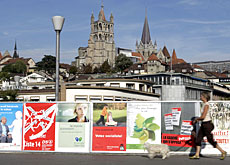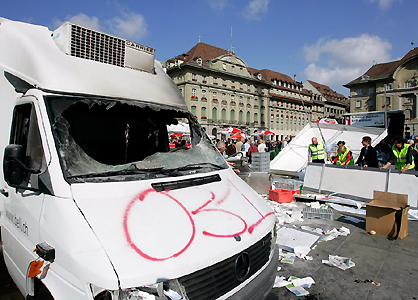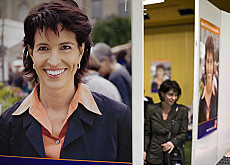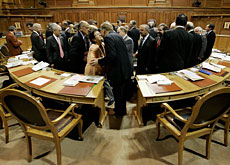Gains forecast for rightwing and Greens

The rightwing Swiss People's Party is set to be the main winner of parliamentary elections later this month. The Greens could see the strongest gain in support.
But the gfs.berne research and polling institute cautions that its final survey cannot be read as an election forecast, as last-minute developments could influence voters’ intentions.
The Swiss People’s Party with its controversial strongman Justice Minister Christoph Blocher is heading for a record 27.3 per cent of the vote, according to the survey carried out three weeks ahead of the elections.
However, the institute’s Claude Longchamp said the rightwing party’s increase would not be as great as in the 2003 elections.
Its centre-left rival, the Social Democrats would lose 1.6 per cent to come in at 21.7 per cent, while the two centre-right parties, the Radicals and the Christian Democrats would take 15.5 per cent and 15.4 per cent respectively.
The Greens – the most popular party not represented in the cabinet – are heading for ten per cent of the vote, up 2.6 per cent on 2003.
“The latest assessments of the party strengths are not a forecast, because this barometer – like other such surveys in Switzerland – do not take into account the intentions of the Swiss abroad community,” said Claude Longchamp of the gfs.berne institute.
There are about 111,000 Swiss expatriates registered to vote.
The institute also pointed out that the margin of error in a poll is plus or minus 2.2 per cent.
Headline riot
The final gfs survey was carried out last week, before a pre-election rally on Saturday by the People’s Party in the capital, Bern, which was disrupted by leftwing extremists.
The violence caused a public outcry in Switzerland and made the headlines abroad. Experts say the incidents could give another boost to the People’s Party on October 21.
Longchamp agreed that such events could have a considerable impact on the outcome of a poll.
Shortly before polling day four years ago, an announcement about health insurance premiums by Interior Minister Pascal Couchepin led pollsters to misjudge the percentage for his Radical party.

More
House of Representatives
Focus on personality
One of the dominant features in the run-up to this year’s ballot has been the increasing focus on personalities.
“For the first time in the history of parliamentary elections since 1959 cabinet ministers have been the focus of the campaigns,” the institute said.
Apart from Blocher – who has dominated the People’s Party campaign – Economics Minister Doris Leuthard of the Christian Democrats and to a lesser extent Social Democratic Foreign Minister Micheline Calmy-Rey carried the flags for their respective parties.
This has been the case despite the fact that Swiss cabinet ministers are neither accountable to their political parties nor are they party leaders.
swissinfo, Urs Geiser

More
Senate
The poll is the latest in a series of nine surveys carried out by the gfs.berne institute on behalf of swissinfo’s parent company, the Swiss Broadcasting Corporation.
2,021 people from across the country were interviewed for the latest survey at the end of September and the beginning of October.
The margin of error is 2.2%.
Parliamentary elections are scheduled for October 21. Both chambers will choose the new cabinet on December 12.
Comparison with 2003 election results:
People’s Party: 27.3%, +0.6%
Social Democrats: 21.7%, -1.6%
Radicals: 15.5%, -1.8%
Christian Democrats: 15.4%, +1.0%
Greens: 10.0%, +2.6%

In compliance with the JTI standards
More: SWI swissinfo.ch certified by the Journalism Trust Initiative












You can find an overview of ongoing debates with our journalists here . Please join us!
If you want to start a conversation about a topic raised in this article or want to report factual errors, email us at english@swissinfo.ch.